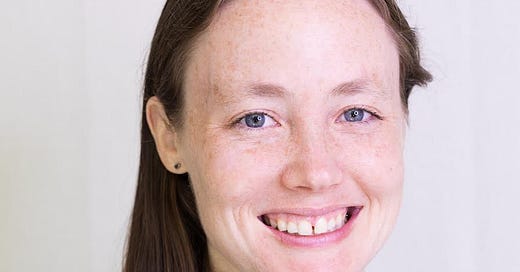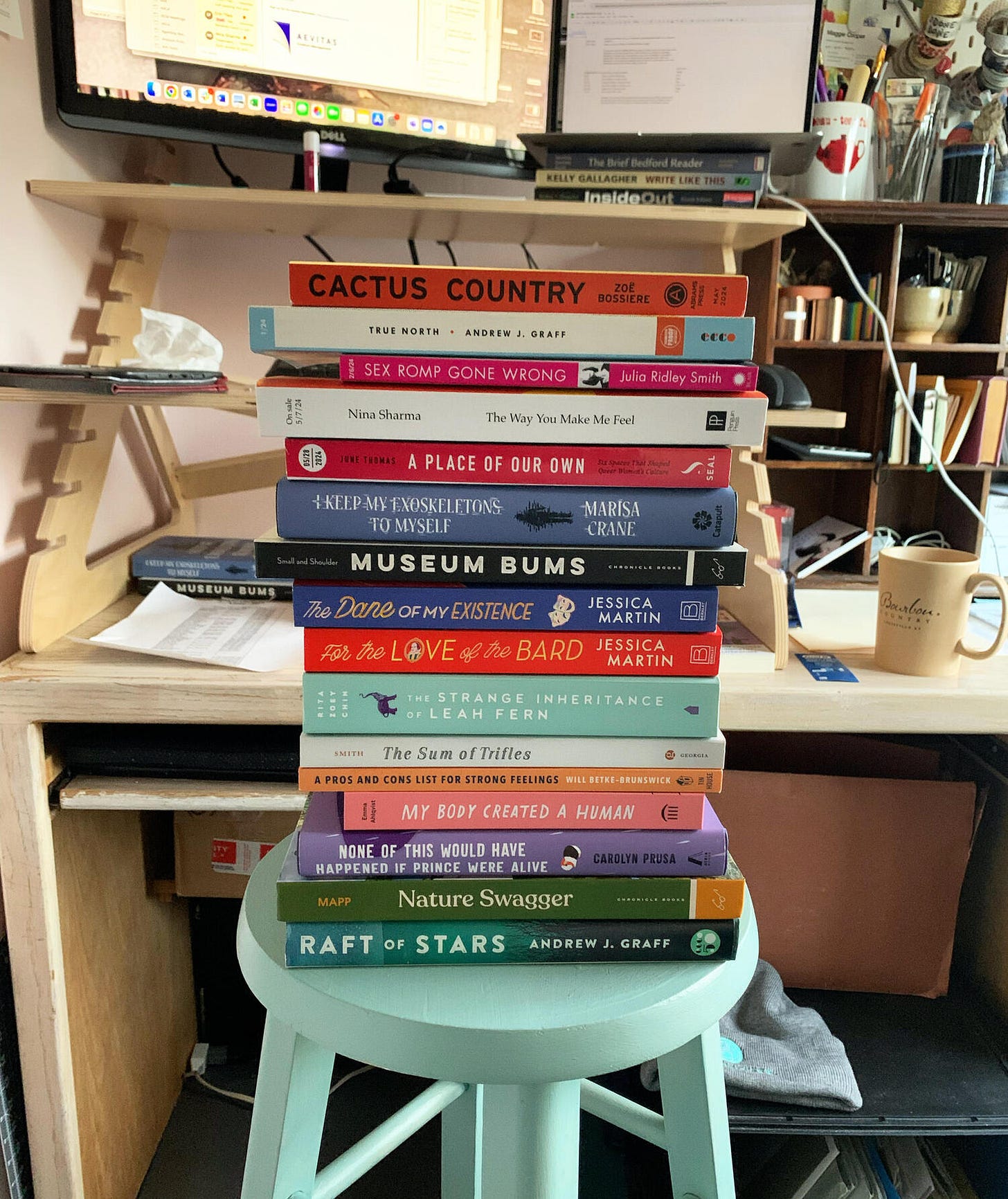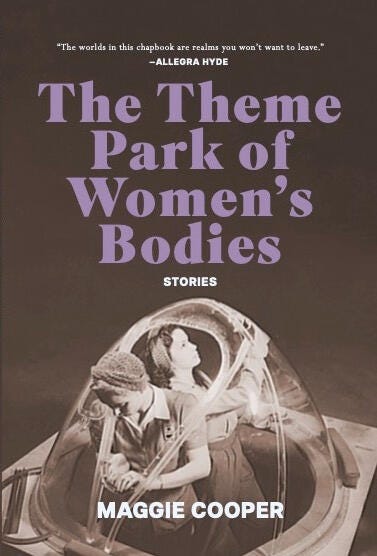Three Questions with literary agent Maggie Cooper
& writer! & baked goods connoisseur! & creative! & editor!
Listen, I’ve never met a single person who doesn’t find Maggie Cooper to be the most delightful of human beings. She’s an inspiration, a marvel, and truly, I think she deserves bracelets that say, “What would Maggie Cooper do?” I’ve been lucky enough to eat breakfast across the table from her, get her advice on agenting when I felt lost, and read BRILLIANT books she’s worked on with brilliant writers.
And we’re lucky enough to live in a time when she’s publishing a (chap)book, The Theme Park of Women’s Bodies, which you can buy here from my favorites, Bull City Press.
She’s generous and smart and I could spend this whole newsletter listing adjectives to make sure you adore her adequately, but her responses do that enough. So, without further ado … MAGGIE COOPER! (clapping!)
1. In my mind, you are a renaissance woman: writer, literary agent, and all-around-creative human. I live for your pastry & baked good reviews, I love the books you work on as an agent (truly, no skips!), your new collection from Bull City Press, The Theme Park of Women's Bodies is endlessly curious, funny, satirical, painful, and full of adventure, and I loved your Google search embroidery project recently. I'm so interested in your advice on keeping the creative tap full. What helps you keep all the plates spinning?
First of all, thank you for including my pastry reviews on the list of my creative/professional projects—truly my life's work! It is certainly true that I have a number of things going on, and that may, in fact, be one of the reasons I am publishing a 50-page collection of tiny stories instead of a 400-page novel! One of the beauties of flash fiction, for me, is that it fits nicely into the bite-sized spaces that I've been able to make for my writing in the last several years, while I’ve also been building my list as an agent.
One thing that really helps me to be creative is to embrace the structure of some kind of communal creative practice. Several of the stories in this collection were written as part of Jami Attenberg's brilliant 1000 Words of Summer (sign up for the newsletter! buy the book!), and more recently, I’ve been getting a lot out of Sunday Softness, my fellow agent Larissa Melo Pienkowski’s online writing group specifically for people who work in publishing. We meet on the last Sunday of every month, which is just frequently enough to provide a nice reset whenever I start to forget I am trying to make time for writing. When I am ready to commit to a longer project, I think I may be destined for the great Annie Hartnett and Tessa Fontaine's Accountability Workshop, which is all about the idea that formally committing to our writing (with a contract!) is a "magical drug.”
The other thing that has really helped me feel connected to my creativity has been to embrace playfulness. I find flash lends itself to this too, and I hope that comes across in the chapbook. Recently, I’ve also been seeking playfulness in some forms of art-making other than writing—I find that it’s much easier to have fun when I’m engaging with something that I don’t consider to be my “real” creative pursuit. In that spirit, I did Wendy MacNaughton's 30-Day Drawing Habit in January, and I’ve participated in the 100 Days Project for the last few years—this year, I tracked all the things I googled and turned the results into collages and doodles and the embroidery you mentioned above.
It’s not particularly fancy, but Elise Cripe's Big Dreams, Daily Joys is one of my forever reminders that the only way to have a creative life is just to do it, and Nancy Reddy, who I also represent (and who I know has worked with Pine State!), has a newsletter called Write More, Be Less Careful that is full of guidance I love.
I think it's important to acknowledge: I don't have a child or other caretaking responsibilities, I don't live in New York City, and I do share living expenses with my spouse—all of which make it almost feasible for me to mostly support myself by dint of my agenting and various side gigs and still carve out at least a little bit of time for all of my making and croissant-eating. I feel lucky, and also like I am still not doing enough!
2. You're a literary agent, arguably selling "bigger house" books, and publishing a story collection with a small (and MIGHTY!) press--what made you decide to go the independent press route, and how has the journey looked and felt?
First things first: as a literary agent, I do sell books to both the big trade houses and wonderful university and independent presses. Indies are great places to publish, and it’s absolutely true that they are often putting out books that are better and more interesting than big trade houses, which tend to be more risk averse and less open to the kinds of weird writing that I know you and I both appreciate. That being said, my goal when I take a book on as an agent is usually the big 5 and their kin because, one, my authors and I need to support ourselves, and two, most indie presses consider submissions from unagented authors, which means I don’t always feel like I add as much value there as I do when I place a book with an editor who would have never seen it otherwise.
I have publishing friends—both agents and editors—who are putting out books of their own with the same publishers we regularly do business with, and I love that for them! I am a little jealous of their book deals and bookstore placement and critical acclaim! But I also am very much not ready to go down that road myself, and I am so delighted that I get to publish this chapbook in a totally different ecosystem, where I didn’t have to roll back any of the weird idiosyncrasies of these stories or (as Hub City Press’s Meg Reid often points out!) worry about whether my publisher was also paying big money for memoirs by horrible politicians.
As a highly skeptical agent-person, I would never advise someone to publish with any press without doing their due diligence, but I was familiar with Bull City Press from when I was in graduate school in North Carolina, and I had a friend who had published with them previously (shoutout to Jim Whiteside, a poet whose work everyone should read!), so I knew they made good-looking books and did their level best to put them in the hands of readers. I also knew that I probably wasn’t going to make any money off of my chapbook and that I would be responsible for most of my own publicity (getting to work with Pine State has been a nice, but unexpected bonus!)—all of which I was totally fine with! Just as I hoped, working with Ross and Noah at Bull City has been great, and I even enjoyed the unexpected perk of having my chapbook included as part of the curriculum in Ross’s undergraduate publishing class at UNCG, which resulted in a dozen very smart students writing me editorial letters and designing possible covers—an absolute delight and very much something that would not happen at a big trade house. Is it still a little weird to be navigating publishing my own (chap)book while also representing the books of a couple of dozen wonderful and talented writers? Yes! But the writers I work with have been extremely supportive, I feel so pleased to get to be a part of this indie ecosystem that I so love, and I’m more galvanized than ever in my enthusiasm for everything that small presses do so well, in spite of having so many fewer resources than the bigger guys.
3. The Theme Park of Women's Bodies feels like a collection no one else could write but you. It's so "voicey" as they say! And because I know you're an editorial agent, what is the relationship between consuming, feeding, fueling other folk's work and protecting the distinctiveness of your own voice?
This is absolutely something I think about. I never want to make someone else’s book sound like me—the whole reason that I signed someone is because I love the way they sound! It’s cheesy, but the editorial project is really figuring out how we can make the book the best version of itself, and I always love it when I give a note and a writer comes back to me with a revision that is totally different (and usually better!) than anything I would have thought up. I work with one writer who sometimes says, “I’m going to respectfully push back on that…,” which I find quite charming and also so right—of course, I want to work with people who are going to be open to feedback, but I also want to work with people who have a clear vision and will push back when they feel like they need to. It helps that I often gravitate towards working with writers who may have similar interests, but different styles from mine; if I read a manuscript and think “I could do that,” I don’t think I’m going to approach that work with the mixture of reverence and appraisal that I need in order to be the one who shapes that manuscript with its author.
Buy Maggie’s (chap)book HERE and join her for events in Boston; Portland, Maine; and Providence this fall!
Maggie Cooper is a graduate of Yale College, the Clarion Writers’ Workshop, and the MFA program at the University of North Carolina at Greensboro. Her writing has appeared in The Rumpus, Ninth Letter, Inch, and elsewhere, and her chapbook of short fiction, The Theme Park of Women's Bodies, is out September 2024 from Bull City Press. She lives with her spouse in the Boston area. Maggie is also a literary agent at Aevitas Creative Management, where she represents adult fiction and nonfiction, with an emphasis on books that make our world weirder, kinder, more joyful, or all three.







